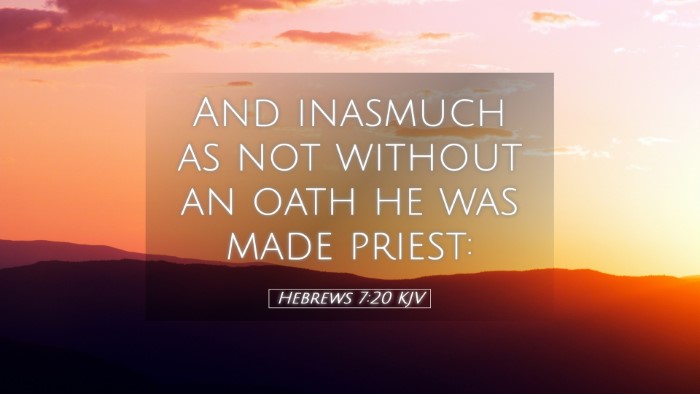Commentary on Hebrews 7:20
Hebrews 7:20: "And inasmuch as He was not made priest without an oath."
Introduction
This verse is pivotal in the author's argument regarding the superiority of Christ's priesthood compared to the Levitical priesthood. The emphasis on the oath demonstrates the permanence and divine appointment of Christ as a priest, which is critical for understanding the nature and efficacy of salvation through Him.
Contextual Background
The Book of Hebrews was written to a predominantly Jewish audience who were at risk of reverting back to the rituals and sacrifices of the Old Covenant due to persecution and hardship. The author emphasizes the transition from the old priestly system to the new order established by Christ to reassure and fortify their faith.
Historical Significance
- Levitical Priesthood: The Levitical priests were appointed by lineage, serving under the Mosaic Law, with limited authority and temporal service.
- Oath in the Appointment: The unique aspect of Christ's priesthood is His divine appointment with an oath, contrasting the hereditary nature of the Levitical priests.
Theological Insights
The oath mentioned in this verse highlights several key theological themes:
- Divine Assurance: God's oath is a solemn promise that underlines the reliability of Christ’s priesthood.
- The Permanence of Christ's Priesthood: Unlike the Levitical priesthood, which was temporary and could not achieve perfection, Christ's priesthood is eternal.
- Salvation through Christ: The assurance given by the oath confirms that salvation through Christ is secure and irrevocable.
Matthew Henry's Perspective
Matthew Henry emphasizes the unique position of Christ, noting that He was “not made priest without an oath.” Henry explains that the oath signifies a greater certainty and holds more weight than the appointments of the Old Testament priests. He posits that Christ, as a priest, carries the authority of an eternal covenant.
Albert Barnes' Commentary
Albert Barnes highlights that the establishment of Christ’s priesthood through an oath illustrates the difference between His ministry and that of the Levitical priests. Barnes reflects on the implications of God's promise, asserting that this divine affirmation provides believers with confidence in their high priest's ability to intercede. He explains that by this oath, God assures believers of the stability of their salvation.
Adam Clarke's Exegesis
Adam Clarke provides a detailed analysis of the phrase “not made priest without an oath.” He identifies the significance of the oath in establishing the legitimacy and honor of Christ's ministry. Clarke draws parallels between the old covenant and the new, noting how the lack of an oath in the former system creates a stark contrast to the solemnity with which God has appointed Christ. He argues that this divine endorsement equips Christ with the authority necessary to perform His redemptive work effectively.
Application for Modern Believers
Understanding Hebrews 7:20 holds great significance for contemporary believers, especially those in ministry. This verse encourages pastors, students of the Word, and theologians to reflect on the following themes:
- Seeking Assurance: Believers can find encouragement in God's unwavering faithfulness through the oath of Christ’s priesthood.
- The Assurance of Salvation: The certainty of salvation provides a powerful foundation upon which faith can be built, offering comfort amid trials.
- Engagement in Ministry: Pastors are reminded of the importance of Christ’s intercession, motivating them to rely on His authority in their service.
Conclusion
Hebrews 7:20 encapsulates a critical theological truth about Christ’s eternal priesthood, set apart by divine oath. The commentary from Henry, Barnes, and Clarke highlights the contrast between the old and new covenants, reinforcing the certainty of salvation. For readers today, this verse calls for a deeper appreciation of the profound work of Christ, encouraging believers to anchor their faith in the unshakeable promises of God.


